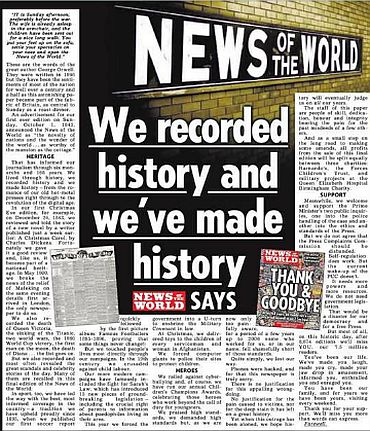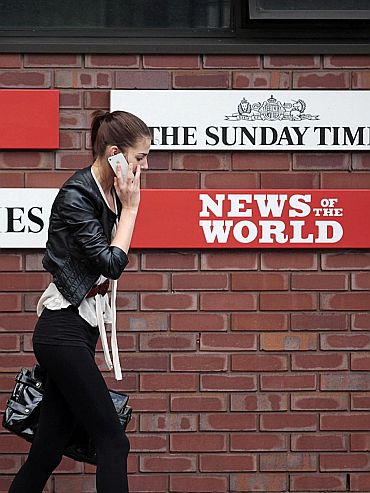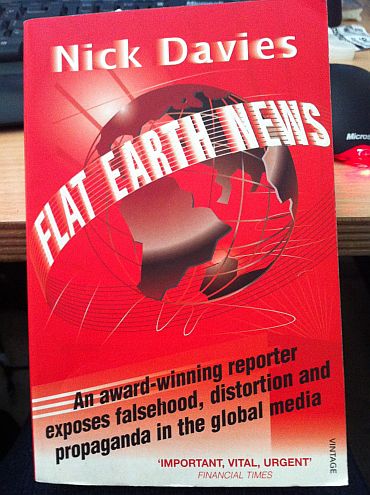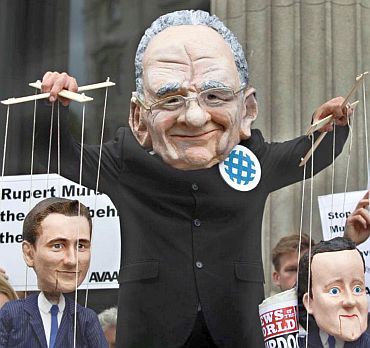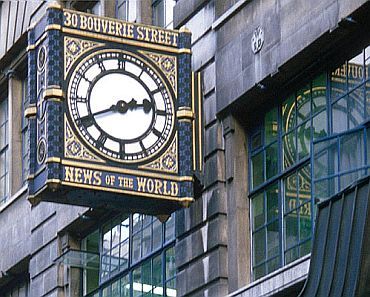 | « Back to article | Print this article |
Where is the world of NEWS headed?
In the cut and thrust of British tabloid journalism, the fact that News of the World illegally accessed mobile phones to ferret out information to be used in sensational stories is not exactly breaking news.
What really 'changed the world last week' -- as Labour leader Ed Miliband put it on Monday -- was the fact that the targets of phone hacking were no longer only celebrities, but also victims of crime, and terrorism (July 7 London bombing) and kin of soldiers dead in Iraq and Afghanistan.
As long as the targets were celebrities, the cosy but unhealthy relationship between press, politics and the police in British public life was undisturbed.Click on NEXT to read further...
Where is the world of NEWS headed?
So was the practice of 'chequebook journalism' -- the practice of paying for information, interviews or exclusive access -- in an intensely competitive and profit-driven environment. This practice involved hiring private investigators for information.
But public revulsion welled up and everything hit the ceiling when it was revealed that the targets included Milly Dowler, a murdered teenager whose case was widely covered, and family members of dead soldiers.
Until then, many tabloids and their journalists indulged in the same news-gathering practices that brought down the News of the World and seriously dented the influence and shares of Rupert Murdoch's media empire.
Where is the world of NEWS headed?
He added: "As long ago as 2006 the then Information Commissioner revealed that over 300 journalists from 32 publications had obtained over 3,000 items of personal information by illegal means from just one private investigator. It's time newspaper editors came clean about any underhand methods they have used in the past".
Stuart Allan, professor of journalism at Bournemouth University, said: "This is a sad day for British journalism. As we sift through the smouldering ruins of a once-proud newspaper, however, we should seize the opportunity to think anew about how to improve the quality of our press".
Where is the world of NEWS headed?
He added: "The News of the World was at its best when it championed the interests of ordinary people in all aspects of public life, engaging with pressing issues of social relevance, rather than being obsessed with the whirl of celebrity infotainment. British citizens deserve better. It is time the Rupert Murdochs of this world recognised this simple fact".
Experts have described the practice of privileging profits to social responsibility as 'Murdochisation', after Murdoch introduced new market-oriented measures to drive profits through dumbing down news content.
Granville Williams, a senior British journalist and academic, was the first to introduce the term Murdochisation and called it an "ugly sounding word to describe an ugly phenomenon".
Where is the world of NEWS headed?
The word emerged in the 1990s to describe the use and abuse of media power by Murdoch's company. The two key elements of this phenomenon, he says, are: "the use of predatory pricing to weaken and eliminate other newspaper titles; and the subordination of freedom of expression to the higher priority of commercial expansion".
Nick Davies, the Guardian journalist who is credited with doggedly exposing the illegal news gathering practices, details the modus operandi of private investigators hired by newspapers (tabloid and broadsheet) in his best-selling book on falsehood, distortion and propaganda in journalism, Flat Earth News.
In a chapter titled 'The Dark Arts', Davies writes: "The truth is that what was once the occasional indulgence of a few shifty crime correspondents has become the regular habit of most news organisations".
He adds: "The hypocrisy is wonderful to behold. These organisations exist to tell the truth and yet routinely they lie about themselves...If falsehood and distortion are now the routine products of the corporate news factory, corruption is its most dangerous by-product".
Where is the world of NEWS headed?
The phone-hacking row also brought into focus the "too cosy" relationship, as Miliband put it, between politicians and newspaper owners such as Murdoch. He admitted that it was wrong not to speak up against the illegal news-gathering practices of such organisations while seeking their support.
Each of the last three prime ministers, Tony Blair, Gordon Brown and David Cameron, have courted Murdoch, but the phone hacking controversy has the potential of reducing -- if not eliminating -- the dependence of politicians on media influence.
As Miliband said, this did not mean that politicians will stop speaking to newspaper owners or versa, but that politicians will increasingly talk about it when the news media go wrong on the basics of journalism.
Where is the world of NEWS headed?
According to Jempson, "Crocodile tears from the Murdoch camp, from Downing Street and from the leader of the opposition will assuage none of the public's concerns about the state of UK journalism and the unhealthy relationship between the press, politicians and the police".
He added: "We need root and branch reform of the regulatory system for the print, broadcasting and online media....what a pity the Prime Minister did not announce the ending of the lobby system, which enables senior politicians and their advisors to set the agenda through anonymous tip offs to journalists".
The closure of the News of the World, Jempson said, was a classic 'crisis management' move -- act promptly, assure customers that things will be put right, then re-launch with a new brand image when the dust has settled.

